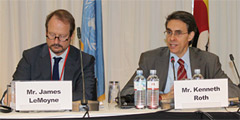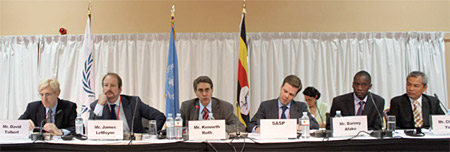|
In the context of the stocktaking exercise on international criminal justice, a “Peace and Justice” session was held during the Review Conference in Kampala. The debates offered an opportunity for States to affirm that peace and justice are complementary, rather than mutually exclusive.
The first speaker of the panel, Mr David Tolbert, President of the International Center for Transitional Justice, stated that the long-term benefits of pursuing justice far outweigh any short-term benefits of amnesties. He also pointed out that the role of the Prosecutor needs to be understood: he has to know the situation on the ground and be conscious of the importance of the timing of issuing arrest warrants.
Mr James LeMoyne, former Special Adviser for Colombia to the United Nations Secretary-General, addressed the panel by stressing that peace processes that take justice into account are more sustainable and lasting. If mediators would be allowed to have some flexibility on how to approach justice issues in particular regarding timing, that would help their work considerably. Nevertheless, this flexibility should not be extended to the most serious crimes under the Rome Statute.
Mr Barney Afako, Legal Adviser to the Chief Mediator on the Ugandan peace process negotiations, stated that the dilemma of contradicting strategies to render justice and establish peace would exist as long as there are ongoing conflicts.
In spite of the fact that it took 30 years to start prosecuting some of the perpetrators of the Cambodian genocide, not a single day did the victims forget that they wanted justice, explained Mr Chhang Youk, Director of the Documentation Center of Cambodia.
In his closing remarks the moderator of the panel, Mr Kenneth Roth, Executive Director of Human Rights Watch, highlighted that the establishment of the International Criminal Court (ICC) had indeed brought about a paradigm shift: whereas before the discussion was called “peace versus justice”, you could now observe an understanding of peace and justice as allies which sustain one another. Nevertheless, tensions between cessation of violence and justice could arise which had to be addressed and managed carefully. Furthermore, Mr Roth pointed to some new challenges resulting from the ICC’s existence. Mediators had to find ways to convince parties to come to the negotiating table against the backdrop of actual or possible indictments. The potential deterrent effect of justice would be undermined if it was viewed as an exceptional or negotiable measure.
The panelists generally agreed that alternative transitional justice mechanisms should not be seen as an alternative, but rather supplementary to criminal justice processes, with the ICC concentrating on the most serious crimes.
As for victims, experience showed that their views shifted over time, with the immediate goal for peace followed by a quest for justice.
 Finally, Mr. Roth stated that the establishment of the ICC constituted a development as momentous as the adoption of the Universal Declaration of Human Rights. He called on States to demonstrate their commitment through executing arrest warrants and standing up to those that defy the ICC.
Finally, Mr. Roth stated that the establishment of the ICC constituted a development as momentous as the adoption of the Universal Declaration of Human Rights. He called on States to demonstrate their commitment through executing arrest warrants and standing up to those that defy the ICC.
Further information about the Review Conference can be found on the website of the International Criminal Court at:
https://asp.icc-cpi.int/en_menus/asp/reviewconference.
For additional information please contact Ms. Bettina Ambach (+256 787-700-942, email: [email protected]) or Ms. Suzan Khan at (+256 787-105-832, email: [email protected])
